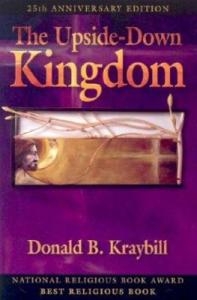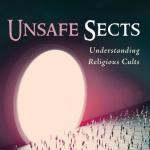The Upside-Down Kingdom: Chapter One: Down Is Up
Before I begin commenting on this book I want to tell a true story. Many years ago my wife and I were members of a Baptist church in an Upper Midwest capital city (USA). The state’s capitol building was about two miles away, but we could see it straight down the freeway near the church. The church was a medium-sized one that straddled the “line” between city and suburb. Most of the members and attenders (about 400) were suburbanites. In most respects, perhaps almost all, it was a typical suburban (American) Baptist church. All white, mostly upper middle class, moderately evangelical, comfortable.
One couple, members of the church, were quite obviously socially marginal. They were possibly even mentally challenged. Their words and actions shouted “awkward”—in that setting. Their car and clothes were old. They stood out in the congregation as not quite being like others. They were poor and not in any way even possibly “upwardly mobile.” Few people even knew them even though they attended Sunday morning worship faithfully.
Another couple drove to church in a new, sleek Porsche sedan. They were about the same age as the other couple, mid-forties. They wore expensive clothes and were finely coiffed. Their bearing was straight and serious. They were obviously highly educated, had reached the pinnacle of “upwardly mobile,” and acted aloof. However, they tithed to the church. The man was a politician and candidate for his party’s nomination for the state’s governorship. He served in the legislature.
One Sunday I overheard two deacons talking. Apparently the second couple were leaving the church for some unknown reason. One said to the other one: What will we do without him here? In my heart I knew that question would not be asked if the first couple were about to leave the church.
The first chapter of Donald Kraybill’s book The Upside-Down Kingdom argues that Jesus’s idea of the kingdom of God was not other-worldly but radically this-worldly—a social order among people. “Kingdom living is fundamentally social. It involves membership, citizenship, loyalties, and identity. Citizenship in a kingdom entails relationships, policies, obligations, boundaries, and expectations. These dimensions of kingdom life supersede the whims of individual experience. Kingdom membership clarifies a citizen’s relationship to the king, to other citizens, and to other kingdoms. Living in a kingdom means sharing in its history and helping shape its future.”
In and of itself, that quote (above) is simply true. But what Kraybill wants us to consider is whether the kingdom of God taught and lived by Jesus is also like that—social and not only spiritual.
I don’t know about you, but most of the churches I have been a member of (or attended regularly), and the count is twelve (!), have treated “kingdom of God” as a purely spiritual reality. First, they say it is heaven. Second, they say it is future, after Jesus returns. Third, they say it is Jesus living in our hearts. Fourth, they say it is the church, the aggregate of true believers in Jesus Christ. Rarely have I heard that it is social. In fact, the the churches I grew up in, “social gospel” was a phrase tantamount to “liberal” and “heretical.”
American evangelist D. L. Moody is supposed to have preached a “lifeboat ethic.” That is, he testified that God told him to build a lifeboat and get as many souls into is as possible and wait for the return of Christ. Around the same time, a large number of progressive Christians in America, led by people like Walter Rauschenbusch (a Baptist theologian), developed a “social gospel.” For them, the gospel is about transforming society, even “Christianizing the social world” in political terms. Somehow these two Christian ethics drifted far apart and became even hostile towards each other. You could be in one or the other but not both. Kraybill is arguing that we MUST be in both because Jesus was.
So far, in Chapter One, Kraybill has not said much about HOW the kingdom of God is “upside-down.” He will. He has hinted at it. It will challenge that church of the story I told at the beginning here. And here’s the kicker. That rich politician’s tithes were not the issue; the issue was the congregation’s own upward mobility in terms of social standing in the community. I was “plugged in” enough to know what the two deacons were really saying and meaning. They believed the rich politician’s presence in the congregation gave it a certain “panache” among similar churches in the community. I knew these two deacons well enough to have reason to believe they were slightly embarrassed by the first couple who always sat right in the middle of the congregation near the platform in all their not-so-finery acting a bit like “country bumpkins.”
Kraybill tells us what he will NOT do in this book. He will not spell out specific ways in which the vision of the kingdom of God as “upside-down” works itself out in today’s church or society here, now. What he will do is spell out radical principles of the upside-down kingdom of God that might be enacted differently in different times and places. But one thing is clear: Kraybill believes there ARE definite principles of the kingdom that apply in all times and places and they challenge the usual way in which people do things, including and especially within Christian communities.
I will next take up Chapter Two in about one week. Please do not read ahead.
*Note: If you choose to comment, make sure you have read this chapter. If you have not read it, you may ask a question. Make sure your comment or question is relatively brief (no more than 100 words), on topic, addressed to me, civil and respectful (not hostile or argumentative), and devoid of pictures or links.*














